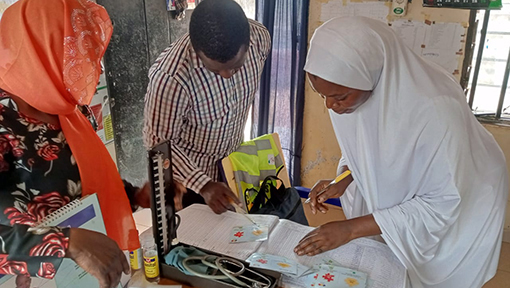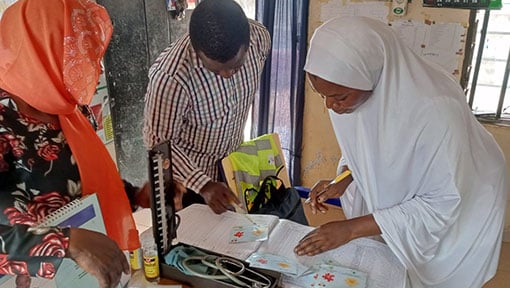Webinar on Nigeria’s Co-financing Strategy Shares Learnings from Four States
Contributors: Uduak Chidozie Ananaba, Dr. Victor Igharo, Dr. Ahmed Hamidu Kara, Dr. Ememobong Jaja, Hajara Yahaya and Hannatu Francis Dung
As previously shared, TCI’s innovative co-financing strategy in Nigeria has galvanized not only increased domestic financing commitments by state governments towards family planning programs and interventions but also resulted in increased release of those funds and spending. This is no small feat in ensuring sustained impact long after the states’ engagement with TCI concludes. As a result, more than 400 members of the development community in and outside of Nigeria registered to take part in a webinar on Feb. 10, 2021, to learn more about the co-financing strategy.
Dr. Victor Igharo, Chief of Party for TCI in Nigeria, introduced TCI and then explained the key premises on which the co-financing strategy is built upon:
- It ensures, from the outset, financial sustainability and transition to self-reliance. Through a graduated co-financing mechanism, the strategy brings to bear the absorptive capacity of states and intentionally avoids the risk of financial over-saturation, which may weaken the growing pace of accountability and fiscal responsiveness of partner states.
- It deploys policy and program advocacy to ensure states are on a pathway to ownership and health systems resilience. Built on the cardinal premise that co-financing does not happen in isolation, TCI works with partner states to design a robust advocacy strategy which includes setting the appropriate policy framework and engagement plans to foster consistent and sustained financing for health.
- It institutionalizes health financing transparency, accountability and good governance. The core of TCI’s work is to build management and leadership capabilities of states to lead, drive and own its health program while supporting them to transition to self-reliance and autonomy. States can leverage governance and accountability structures including advocacy groups and accountability platforms like the budget tracking team, technical working groups, and steering committees.
With this background information, Igharo then shared exactly how the co-financing strategy works and some aggregated results across 10 TCI-supported states as well as results by Nigeria’s first phase states (Bauchi, Delta, Kano, Niger and Ogun) and the second phase states (Abia, Anambra, Plateau, Rivers and Taraba).
A total of $2,080,864 has been released by state governments as co-investment into family planning programs and interventions as of June 2020.

Committed funds vs. actual contributions across 10 states – from July 2019 to June 2020.
To learn more about what led to these results, state representatives from Taraba, Rivers, Bauchi and Plateau share their experiences. They shared what the situation was like prior to engagement with TCI and then shared their insights and lessons learned as to what has helped push the needle for domestic financing in their respective context as a result of TCI.
Many characteristics were shared across the states related to the situation before TCI.
- No dedicated budget lines for family planning as it was subsumed under reproductive health more broadly
- Inconsistent and inadequate release of funds for family planning implementation
- A lack of advocates in government and the community, urging for more family planning funding
- Minimal funding for family planning consumables
When reflecting on what TCI has done to help change this situation and catalyze domestic financing and release, the state representatives noted the the following:
- Ensuring policymakers, family planning technocrats and implementing partners are all part of the development of a statewide integrated family planning workplan
- Integrating family planning demand creation and service delivery into other primary health intervention areas and programs
- Establishing and/or strengthening the capacity of community structures, such the advocacy core groups and budget task teams, to advocate for family planning funding and hold the government accountable to its commitments
- Triangulating financial data with program results to advocate for greater investments
- Establishing a dedicated budget line
- Facilitating a shared understanding and commitment of the goals of the co-financing strategy among government through TCI’s grant management orientation
The transparency and accountability that is promoted and encouraged through the implementation of co-financing strategy itself has also earned governments the trust of TCI. Other factors that have influenced TCI-supported states to commit and release more funding towards family planning programs include:
- The overall effectiveness and cost-efficiency of the high-impact interventions; Hajara Yahaya, Bauchi State Coordinator, said “With the use of little amounts of fund, we can achieve greater impacts.”
- Regular tracking and review of performance through quarterly scorecards and TCI’s dashboard
- Engagement and strengthening of community structures to mobilize for family planning
All of these lessons are important to consider in adopting this strategy. Dr. Ahmed Hamidu Kara, Taraba State ACG Chairman, also shared a few challenges important to anticipate and address, if possible, in adopting the strategy.
- Aligning budget calendar year
- Dwindling financial resources of the state
- Cumbersome memo system of government that relies on the state governor to approve all expenses – however, the governor may be traveling and not be available to provide his/her approval
To learn more about the strategy and hear the experiences from the state representatives, check out the webinar recording below.






